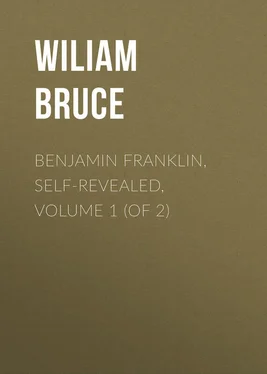Wiliam Bruce - Benjamin Franklin, Self-Revealed, Volume 1 (of 2)
Здесь есть возможность читать онлайн «Wiliam Bruce - Benjamin Franklin, Self-Revealed, Volume 1 (of 2)» — ознакомительный отрывок электронной книги совершенно бесплатно, а после прочтения отрывка купить полную версию. В некоторых случаях можно слушать аудио, скачать через торрент в формате fb2 и присутствует краткое содержание. Жанр: foreign_antique, foreign_prose, на английском языке. Описание произведения, (предисловие) а так же отзывы посетителей доступны на портале библиотеки ЛибКат.
- Название:Benjamin Franklin, Self-Revealed, Volume 1 (of 2)
- Автор:
- Жанр:
- Год:неизвестен
- ISBN:нет данных
- Рейтинг книги:5 / 5. Голосов: 1
-
Избранное:Добавить в избранное
- Отзывы:
-
Ваша оценка:
- 100
- 1
- 2
- 3
- 4
- 5
Benjamin Franklin, Self-Revealed, Volume 1 (of 2): краткое содержание, описание и аннотация
Предлагаем к чтению аннотацию, описание, краткое содержание или предисловие (зависит от того, что написал сам автор книги «Benjamin Franklin, Self-Revealed, Volume 1 (of 2)»). Если вы не нашли необходимую информацию о книге — напишите в комментариях, мы постараемся отыскать её.
Benjamin Franklin, Self-Revealed, Volume 1 (of 2) — читать онлайн ознакомительный отрывок
Ниже представлен текст книги, разбитый по страницам. Система сохранения места последней прочитанной страницы, позволяет с удобством читать онлайн бесплатно книгу «Benjamin Franklin, Self-Revealed, Volume 1 (of 2)», без необходимости каждый раз заново искать на чём Вы остановились. Поставьте закладку, и сможете в любой момент перейти на страницу, на которой закончили чтение.
Интервал:
Закладка:
– such are some of the questions, thoroughly racy of Franklin in his youth, which are shown by this book to have been framed by him for the Junto. After the association had been under way for a time, he suggested that all the books, owned by its members, should be assembled at the room, in which its meetings were held, for convenience of reference in discussion, and so that each member might have the benefit of the volumes belonging to every other member almost as fully as if they belonged to himself. The suggestion was assented to, and one end of the room was filled with such books as the members could spare; but the arrangement did not work well in practice and was soon abandoned.
No sooner, however, did this idea die down than another shot up from its stump. This was the subscription library, now the Philadelphia City Library, founded by Franklin. In the Autobiography , he speaks of this library as his first project of a public nature; but it seems to us, as we have already said, that the distinction fairly belongs to the Junto. He brought the project to the attention of the public through formal articles of association, and, by earnest efforts in an unlettered community, which, moreover, had little money to spare for any such enterprise, induced fifty persons, mostly young tradesmen, to subscribe forty shillings each as a contribution to a foundation fund for the first purchase of books, and ten shillings more annually as a contribution for additional volumes. Later, the association was incorporated. It was while soliciting subscriptions at this time that Franklin was taught by the objections or reserve with which his approaches were met the "impropriety of presenting one's self as the proposer of any useful project, that might be suppos'd to raise one's reputation in the smallest degree above that of one's neighbors, when one has need of their assistance to accomplish that project." He, therefore, kept out of sight as much as possible, and represented the scheme as that of a number of friends who had requested him to submit it to such persons as they thought lovers of reading. This kind of self effacement was attended with such happy consequences that he never failed to adopt it subsequently upon similar occasions. From his successful experience, he says in the Autobiography , he could heartily recommend it. "The present little sacrifice of your vanity," to use his own words, "will afterwards be amply repaid. If it remains a while uncertain to whom the merit belongs, some one more vain than yourself will be encouraged to claim it, and then even envy will be disposed to do you justice by plucking those assumed feathers, and restoring them to their right owner." Alexander Wedderburn's famous philippic, of which we shall have something to say further on, did not consist altogether of misapplied adjectives. Franklin was at times the "wily American," but usually for the purpose of improving the condition of his fellow creatures in spite of themselves.
The library, once established, grew apace. From time to time, huge folios and quartos were added to it by purchase or donation, from which nobody profited more than Franklin himself with his insatiable avidity for knowledge. The first purchase of books for it was made by Peter Collinson of London, who threw in with the purchase as presents from himself Newton's Principia and the Gardener's Dictionary , and continued for thirty years to act as the purchasing agent of the institution, accompanying each additional purchase with additional presents from himself. Evidence is not wanting that the first arrival of books was awaited with eager expectancy. Among Franklin's memoranda with regard to the Junto we find the following: "When the books of the library come, every member shall undertake some author, that he may not be without observations to communicate." When the books finally came, they were placed in the assembly room of the Junto; a librarian was selected, and the library was thrown open once a week for the distribution of books. The second year Franklin himself acted as librarian, and for printing a catalogue of the first books shortly after their arrival, and for other printing services, he was exempted from the payment of his annual ten shillings for two years.
Among the numerous donations of money, books and curiosities made to the library, were gifts of books and electrical apparatus by Thomas Penn, and the gift of an electrical tube, with directions for its use, by Peter Collinson, which proved of incalculable value to science in the hands of Franklin who promptly turned it to experimental purposes. When Peter Kalm, the Swedish naturalist, was in Philadelphia in 1748, "many little libraries," organized on the same plan as the original library, had sprung from it. Non-subscribers were then allowed to take books out of it, subject to pledges of indemnity sufficient to cover their value, and to the payment for the use of a folio of eight pence a week, for the use of a quarto of six pence, and for the use of any other book of four pence. Kalm, as a distinguished stranger, was allowed the use of any book in the collection free of charge. In 1764, the shares of the library company were worth nearly twenty pounds, and its collections were then believed to have a value of seventeen hundred pounds. In 1785, the number of volumes was 5487; in 1807, 14,457; in 1861, 70,000; and in 1912, 237,677. After overflowing more contracted quarters, the contents of the library have finally found a home in a handsome building at the northwest corner of Locust and Juniper Streets and in the Ridgway Branch Building at the corner of Broad and Christian Streets. But, never, it is safe to say, will this library, enlarged and efficiently administered as it is, perform such an invaluable service as it did in its earlier years. "This," Franklin declares in the Autobiography , "was the mother of all the North American subscription libraries, now so numerous. It is become a great thing itself, and continually increasing. These libraries have improved the general conversation of the Americans, made the common tradesmen and farmers as intelligent as most gentlemen from other countries, and perhaps have contributed in some degree to the stand so generally made throughout the colonies in defence of their privileges."
Franklin next turned his attention to the reform of the city watch. Under the existing system, it was supervised by the different constables of the different wards of Philadelphia in turn. The Dogberry in charge would warn a number of householders to attend him for the night. Such householders as desired to be wholly exempt from the service could secure exemption by paying him six shillings a year, which was supposed to be expended by him in hiring substitutes, but the fund accumulated in this way was much more than was necessary for the purpose and rendered the constableship a position of profit. Often the ragamuffins gathered up by a constable as his aids were quite willing to act as such for no reward except a little drink. The consequence was that his underlings were for the most part tippling when they should have been moving around on their beats. Altogether, they seem to have been men who would not have been slow to heed the older Dogberry's advice to his watchmen that, if one of them bid a vagrom man stand, and he did not stand, to take no note of him, but to let him go, and presently call the rest of the watch together and thank God that he was rid of a knave.
To this situation Franklin addressed himself by writing a paper for the Junto, not only setting forth the abuses of the existing system but insisting upon its injustice in imposing the same six shilling tax upon a poor widow, whose whole property to be guarded by the watch did not perhaps exceed the value of fifty pounds, as upon the wealthiest merchant who had thousands of pounds' worth of goods in his stores. His proposal was the creation of a permanent paid police to be maintained by an equal, proportional property tax. The idea was duly approved by the Junto, and communicated to its affiliated clubs, as if it had arisen in each of them, and, though it was not immediately carried into execution, yet the popular agitation, which ensued over it, paved the way for a law providing for it which was enacted a few years afterwards, when the Junto and the other clubs had acquired more popular influence.
Читать дальшеИнтервал:
Закладка:
Похожие книги на «Benjamin Franklin, Self-Revealed, Volume 1 (of 2)»
Представляем Вашему вниманию похожие книги на «Benjamin Franklin, Self-Revealed, Volume 1 (of 2)» списком для выбора. Мы отобрали схожую по названию и смыслу литературу в надежде предоставить читателям больше вариантов отыскать новые, интересные, ещё непрочитанные произведения.
Обсуждение, отзывы о книге «Benjamin Franklin, Self-Revealed, Volume 1 (of 2)» и просто собственные мнения читателей. Оставьте ваши комментарии, напишите, что Вы думаете о произведении, его смысле или главных героях. Укажите что конкретно понравилось, а что нет, и почему Вы так считаете.










![Benjamin Franklin - Memoirs of Benjamin Franklin; Written by Himself. [Vol. 2 of 2]](/books/747975/benjamin-franklin-memoirs-of-benjamin-franklin-wr-thumb.webp)
![Benjamin Franklin - Memoirs of Benjamin Franklin; Written by Himself. [Vol. 1 of 2]](/books/748053/benjamin-franklin-memoirs-of-benjamin-franklin-wr-thumb.webp)
